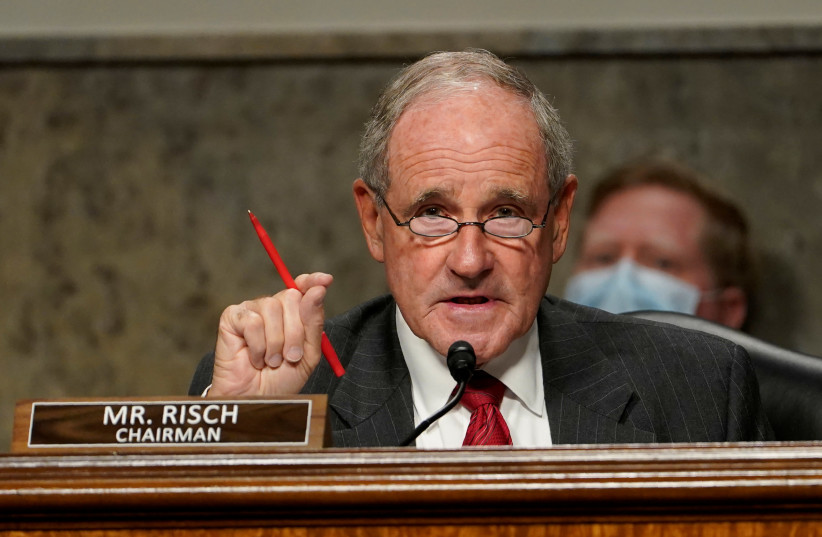WASHINGTON – The Senate Foreign Relations Committee held a hearing on Tuesday on the nomination of Deborah Lipstadt to serve as the next envoy to monitor and combat antisemitism. A vote is expected at another date.
Committee chairman Sen. Bob Menendez (D-New Jersey) said Lipstadt was and impeccable nominee in terms of her knowledge of antisemitism, “probably not just the US, but a global expert and scholar.”
“I’m truly disappointed it took this long to schedule your hearing, and I look forward to your swift confirmation,” he said. “I believe you will be a huge asset to the [State] Department.”
Sen. Jacky Rosen (D-Nevada), who introduced Lipstadt’s nomination, said Lipstadt “has devoted her life to fighting back against antisemitism and Holocaust denial.”
“Her nomination comes at a critical time in the fight against antisemitism,” she said. “In the United States and across the globe, we are witnessing a significant rise in antisemitism, violent extremism and Holocaust distortion and denial. I’m honored to introduce to you today – an exceptionally qualified nominee to serve as special envoy and take on global antisemitism head-on, no matter where it rears its ugly head.”

Asked about the recent Amnesty International report, Lipstadt said, “I found the language used in that report more than ahistorical. I found it unhistorical.”
“Branding Israel an apartheid state is more than historically inaccurate,” she said. “I believe it’s part of a larger effort to delegitimize the Jewish state. Such language, I see it spilling over onto campuses where it poisons the atmosphere, particularly for Jewish students.”
Asked whether she believed that criticism of Israel is antisemitism, Lipstadt said: “Criticism of Israeli policy is not antisemitism. If you want to hear criticism of Israeli policies, I suggest you sit yourself down in a cafe in Tel Aviv or in Jerusalem, whatever part of the country, depending who is in the government. It’s the national sport in Israel, second only maybe to soccer or maybe more than that.”
“So I don’t think any rational-minded person would think that criticism of Israeli policies is antisemitism,” she added. “I do think there’s certain things that cross the line into antisemitism, and criticism can often cross the line. The IHRA [International Holocaust Remembrance Alliance] definition gives examples.”
The Foreign Relations Committee’s Republican senators raised concerns over Lipstadt’s past tweets in which she was critical of Republican lawmakers. Sen. Marco Rubio (R-Florida) said the position was supposed to be filled by a nonpartisan figure “to develop and implement the department’s policies to address the ancient and evil poison of antisemitism around the world.”
He reiterated the need to keep the “tradition of nonpartisan approach to America’s antisemitism policy.”
Committee Ranking Member Sen. James Risch (R-Idaho) raised similar concerns.
“I know there was some grumbling about how quickly [the] nomination went forward,” he said. “This probably is a learning moment for people who want to be appointed to something that requires Senate confirmation. And it is that whenever an appointee has made remarks publicly regarding a member, particularly in the Senate committee that’s under jurisdiction, it always draws and should draw more scrutiny and more vetting than usual in as much as our job of advice and consent is very important.”
Lipstadt responded by saying she “learned not to tweet in the middle of the night. Very bad thing to do.”
“I have sometimes not been as nuanced in my tweets as I like,” she said. “But I think if you look at my criticism holistically, you will see that I have been exceptionally critical of members of the Democratic Party, of people on the [other] end of the political spectrum.”
“I firmly believe that those people who only see antisemitism or any form of prejudice, but certainly antisemitism on the other side of the political spectrum, are not really interested in fighting antisemitism; they’re weaponizing antisemitism, and there is no excuse for that at all,” Lipstadt said.
Sen. Ron Johnson (R-Wisconsin) said some of Lipstadt’s tweets were aimed at him. He asked her, “Why did you go on social media and level these vile and horrible charges against people, including me, that you don’t even know?”
Lipstadt replied: “I would not do diplomacy by tweet. While I may disagree with what you said specifically, and I think that’s a legitimate difference, I certainly did not mean it, and I’m sorry if it was taken, and I’m sorry if I made it, in a way that it could be assumed to be political.”
Johnson told Lipstadt he appreciated and accepted the apology, but he would not vote for her confirmation.
“I think somebody that has had a 30-year professional career ought to know better,” Johnson said. “And when you’re being nominated and considered for confirmation to a position of diplomacy representing the United States, I certainly cannot support your nomination. I hope my other colleagues won’t either.”
Jewish Federations of North America senior vice president for public affairs Elana Broitman said in a statement: “We are grateful to Chairman Menendez, Ranking Member Risch, and the committee members for today’s hearing considering Professor Lipstadt as Special Envoy to Monitor and Combat Antisemitism.
“As we saw in Colleyville, the global and local threats of antisemitism to our community are linked, and we must ensure we have every available tool in place to combat antisemitism wherever it may lurk. We urge a speedy confirmation process,” she said.
Christians United for Israel voiced support for the confirmation as well.
“As her confirmation hearing showed today, Dr. Deborah Lipstadt is the right person at the right time for the position of Special Envoy to Monitor and Combat Antisemitism,” the organization tweeted. “We must counter the surge of Jew hatred. We urge the Senate to confirm Dr. Lipstadt expeditiously.”
